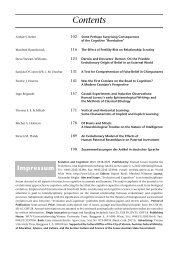Jaak Panksepp and Jules B. PankseppPanksepp, J. (1998b) Attention deficit disorders, psychostimulants,and intolerance <strong>of</strong> childhood playfulness: A tragedyin the making? Current Directions in psychologicalSciences 7: 91–98.Panksepp, J. (1998c) <strong>The</strong> quest for long-term health and happiness:To play or not to play, that is the question. PsychologicalInquiry 9: 56–65.Panksepp, J. (1999) Emotions as viewed by psychoanalysisand neuroscience: An exercise in consilience. Neuro-Psychoanalysis1: 15–38.Panksepp, J. (2000a) <strong>The</strong> neurodynamics <strong>of</strong> emotions: anevolutionary-neurodevelopmental view. In: Lewis, M. D./Granic, I. (eds) Emotion, Self-Organization, and Development.Cambridge Univ. Press: New York, pp. 236–264.Panksepp, J. (2000b) Affective consciousness and the instinctualmotor system. <strong>The</strong> neural sources <strong>of</strong> sadness and joy.In: Ellis, R./Newton, N. (eds) <strong>The</strong> Caldron <strong>of</strong> Consciousness,Motivation, Affect and Self-organization. Vol 16. Advancesin Consciousness Research. John Benjamins Pub.Co: Amsterdam, pp. 27–54.Panksepp, J. (2000c) On preventing another century <strong>of</strong> misunderstanding,Toward a psychoethology <strong>of</strong> human experienceand a psychoneurology <strong>of</strong> affect. Neuro-Psychoanalysis 2: 240–255.Panksepp, J. (2001a) <strong>The</strong> long-term psychobiological consequences<strong>of</strong> infant emotions: Prescriptions for the twentyfirstcentury. Infant Mental Health Journal 22: 132–173.Panksepp, J. (2001b) At the interface between the affective,behavioral and cognitive neurosciences: Decoding theemotional feelings <strong>of</strong> the brain. Brain and Cognition, inpress.Panksepp, J./Normansell, L./Cox, J. F./Siviy, S. M. (1994) Effects<strong>of</strong> neonatal decortication <strong>of</strong> social play <strong>of</strong> juvenilerats. Physiology & Behavior 4: 29–443.Panksepp, J./Miller, A. (1996) Emotions and the aging brain:regrets and remedies. In: Magai, C./McFadden, S. H. (eds)Handbook <strong>of</strong> Emotions and Aging. Academic Press: NewYork, pp. 3–26.Panksepp, J./Knutson, B./Pruitt, D. L. (1998) Toward a neuroscience<strong>of</strong> emotions: the epigenetic foundations <strong>of</strong> emotionaldevelopment. In: Mascolo, M. F./Griffin, S. (eds)What develops in emotional development? Plenum Press:New York, pp. 53–84.Pasqual-Leone, A./Torres, F. (1993) Plasticity <strong>of</strong> the sensorimotorcortex representations <strong>of</strong> the reading finger inBraille readers. Brain 116: 39–52.Peterson, J. B. (1999) Maps <strong>of</strong> Meaning: <strong>The</strong> Architecture <strong>of</strong>Belief. Routledge: New York.Rilling, J. K./Insel, T. R. (1999) <strong>The</strong> primate neocortex in comparativeperspective using magnetic resonance imaging.Journal <strong>of</strong> Human Evolution 37: 191–223.Rinn, W. E. (1984) <strong>The</strong> neuropsychology <strong>of</strong> facial expression,A review <strong>of</strong> the neurological and psychological mechanismsfor producing facial expressions. Psychological Bulletin95: 52–77.Rizzolatti, G./Fadiga, L./Gallese, V./Fogassi, L. (1996) Premotorcortex and the recognition <strong>of</strong> motor actions. BrainResearch and Cognition 3: 131–141.Robinson, T. E./Berridge, K. C. (1993) <strong>The</strong> neural basis <strong>of</strong>drug craving: an incentive-sensitization theory <strong>of</strong> addiction.Brain Research and Reviews 18: 247–291.Segerstråle, U. (2000) Defenders <strong>of</strong> the Truth, <strong>The</strong> Battle forScience in the Sociobiology Debate and Beyond. OxfordUniversity Press: New York.Semendeferi, K./Damasio, H. (2000) <strong>The</strong> brain and its mainanatomical subdivisions in living hominoids using magneticresonance imaging. Journal <strong>of</strong> Human Evolution 38:317–332.Shand, A. F. (1920) <strong>The</strong> Foundations <strong>of</strong> Character, Being aStudy <strong>of</strong> the Tendencies <strong>of</strong> the Emotions and Sentiments.MacMillan and Co: London UK.Schiff, N. D./Plum, F. (1999) <strong>The</strong> neurology <strong>of</strong> impaired consciousness:global disorders and implied models. ASSC E-seminar target article. Retrieved on Dec 2, 1999, from theWorld Wide Web: http://www.phil.vt.edu/assc/niko.html.Solms, M. (1997) <strong>The</strong> Neuropsychology <strong>of</strong> Dreams: A Clinico-AnatomicalStudy. Lawrence Erlbaum Associates: NewYork.Solms, M./Nersessian, E. (1999) Freud’s theory <strong>of</strong> affect,questions for neuroscience. Neuro-Psychoanalysis 1: 5–14.Steiner, J. E./Glaser, D./Hawilo, M. E./Berridge, K. E. (2001)Comparative expression <strong>of</strong> hedonic imact: affective reactionsto taste by human infants and other primates. Neuroscienceand Biobehavioral Reviews 25: 53–74.Thatcher, R. W./Reid Lyon, G./Rumsey, J./Krasnegor, N. (eds)(1996) Developmental Neuroimaging: Mapping the Development<strong>of</strong> Brain and Behavior. Academic Press: San Diego.Toga, A. W./Mazziotta, J. C. (2000) Brain Mapping: <strong>The</strong> Systems.Academic Press: San Diego CA.Valenstein, E. S. (1998) Blaming the brain. <strong>The</strong> Free Press:New York.Valenstein, E. S./Cox, V. C./Kakolewski, J. W. (1970) Reexamination<strong>of</strong> the role <strong>of</strong> the hypothalamus in motivation.Psychological Review 77: 16–31Vargha-Khadem, F./Carr, L. J./Isaacs, E./ Brett, E./Adams, C./Mishkin, M. (1997) Onset <strong>of</strong> speech after left hemispherectomyin a nine-year-old boy. Brain 120: 159–182.Venter, J. C. et al. (2001) <strong>The</strong> sequence <strong>of</strong> the human genome.Science 291: 1304–1351.Wallin, N. L./Merker, B./Brown, S. (1999) <strong>The</strong> origins <strong>of</strong> music.MIT Press: Cambridge MA.Wimmer, M./Ciompi, L. (1995) <strong>Evolutionary</strong> aspects <strong>of</strong> affective-cognitiveinteractions in the light <strong>of</strong> Ciompi’s concept<strong>of</strong> ‘affect-logic’. Evolution and Cognition 2(1): 37–58.Wynn-Edwards, V. C. (1962) Animal Dispersion in Relationto Social Behavior. Oliver & Boyd: Edinburg.Evolution and Cognition ❘ 80 ❘ 2001, Vol. 7, No. 1
Shulamith KreitlerAn <strong>Evolutionary</strong> Perspectiveon Cognitive OrientationIntroduction<strong>The</strong> purpose <strong>of</strong> this paperis tw<strong>of</strong>old. <strong>The</strong> first goal isto describe how the cognitiveguidance <strong>of</strong> behaviorhas developed in an evolutionarysense. <strong>The</strong> conceptionthat cognitionplays a role in regard tosurvival and behavior liesat the core <strong>of</strong> the evolutionaryepistemology theoriesthat consider knowledgeas an evolutionaryprocess subserving survival(CAMPBELL 1974;LORENZ 1977; POPPER1984; RIEDL 1980). <strong>The</strong>setheories provide the bioethologicalbasis for thescientific endeavor to describehow cognitionguides behavior. Startingwith a cognitive theory <strong>of</strong> motivation on the humanlevel, we will examine its evolutionary developmentand implications. In view <strong>of</strong> the novelty <strong>of</strong> the goal,that which we can expect to do in a first exploratorypaper <strong>of</strong> this kind is to confront the issue <strong>of</strong> the evolutionaryaspects <strong>of</strong> the cognitive guidance <strong>of</strong> behaviorand trace some <strong>of</strong> the major tracks along whichthe cognitive guidance <strong>of</strong> behavior seems to have developedin the framework <strong>of</strong> evolution. In order toclarify our question, it is advisable to emphasize thatwhile it is well-known that in the course <strong>of</strong> evolutionboth cognition and behavior have developed each inits own right and in terms <strong>of</strong> its own characteristics,it is neither well-known nor obvious that the cognitiveguidance <strong>of</strong> behavior did. This is precisely ourthesis. Starting from the assumption that in livingorganisms cognition guides behavior (KREITLER/KRE-Abstract<strong>The</strong> paper deals with evolutionary aspects <strong>of</strong> the cognitiveguidance <strong>of</strong> behavior. It is assumed that cognitionguides behavior because <strong>of</strong> empirical evidenceand because the impressive development <strong>of</strong> cognitionin the course <strong>of</strong> evolution suggests that it plays a rolein regard to survival. <strong>The</strong> theory <strong>of</strong> cognitive orientation—atheory <strong>of</strong> cognitive motivation on the humanlevel—is presented as a basic framework for the evolutionaryanalysis. <strong>The</strong> major advantages <strong>of</strong> this theoryare that it provides a comprehensive description <strong>of</strong> theprocesses intervening between input and output andhas ample empirical support. <strong>The</strong> major evolutionaryaspects discussed concern the differentiation betweenmotivation and cognition, the development <strong>of</strong> meaningand the development <strong>of</strong> action, emphasizing therole <strong>of</strong> cognition in regard to each.Key wordsCognition, development, meaning, belief, behavioralprogram.Evolution and Cognition ❘ 81 ❘ 2001, Vol. 7, No. 1ITLER 1976), the question<strong>of</strong> the evolutionary development<strong>of</strong> the cognitiveguidance <strong>of</strong> behavior appearsto be both legitimateand relevant. It is legitimatebecause any phenomenon,structure orprocess that has been observedon the humanlevel has analogues or primaryrudimentary manifestationson earlier evolutionarylevels (MITHEN1996; THORPE 1974). It isrelevant because consideringthe evolutionaryunderstructure and aspects<strong>of</strong> a basic humanprocess provides increasedinsights and opportunitiesfor deeper understanding<strong>of</strong> its structuraland functional properties.Thus, our exploration will be guided by questions,such as “What happened to the cognitive guidance<strong>of</strong> behavior in the course <strong>of</strong> evolution?”, “Whathas evolution done to it?”, “How was it affected byevolution?”, “Which <strong>of</strong> its components were shapedand transformed by evolution?”Our second goal has to do with SKINNER. Years agoduring a Sabbatical stay at Harvard University I hadthe chance to discuss psychological issues with SKIN-NER, who at the time was already retired from HarvardUniversity (1975–1976). As it happened I waslucky enough to have stayed in the same neighborhoodin Cambridge, MA where he lived and thus hadample opportunity <strong>of</strong> discussing science with him.After he became familiar with the theory <strong>of</strong> the cognitiveguidance <strong>of</strong> behavior that Hans KREITLER andI had developed—the theory <strong>of</strong> cognitive orienta-








